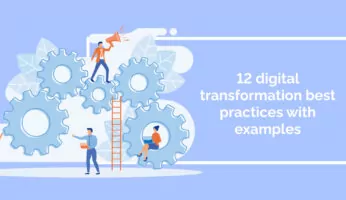
The world is changing quickly, and in order to keep up, HR professionals must rethink the way they perform their jobs. This means going beyond simply learning core HR skills and becoming a “full stack HR” professional.
That is, to succeed in today’s fast-paced business environment, HR professionals must learn a range of skills that are demanded of today’s HR professional, which include not only core HR processes and workflows, but also leadership skills, management skills, technology skills, and specialized knowledge of your industry.
At the same time, it is important to rethink the HR function itself.
Human resources is no longer simply an administrative function, HR and human capital management deliver strategic, bottom-line value to the business.
Below, we will explore these ideas in more detail and see what it takes to become a full-stack HR professional.
Adapt to Change by Becoming a Full-Stack HR Professional
“Full stack” is a term commonly used in software development.
It refers to the idea that in order to develop a software program, it is necessary to have a complete set, or “stack,” of technologies. These include low-level technologies that operate closer to the hardware, high-level technologies that operate closer to the user, and everything in between.
In the same way, a full-stack HR professional must have a stack of skills and knowledge that are suitable for today’s changing, digitally-powered HR world.
Let’s go over the full-stack skills mentioned above in a bit more detail:
Core HR skills
Core HR skills are the skills needed to administer HR functions.
These include the operational tasks in HR, such as payroll, attendance, recruitment, workforce management, employee experience management, and performance management.
All of these skills are still critical to learn and that will not change.
What is changing, however, is the fact that digital technology is permeating the modern workplace, changing the way that these tasks are performed, and even changing organizational structures and operating models.
For instance, HR software such as HCM platforms centralize and automate a great number of tasks that were once performed manually.
For that reason, it is necessary to also learn HR software skills and digital skills.
HR Software Skills
HR software platforms, such as HRIS and HCM platforms, are becoming the standard in the modern organization.
To stay relevant, HR professionals must learn to use these, and they must also learn more advanced HR skills related to technology, such as data and analytics. Usage of people analytics, HR analytics, and any other data related to HR has become essential for the modern HR professional.
In the years ahead, as the enterprise becomes more complex and more digital, some HR professionals may choose to specialize in technology in order to become a HR technology specialist.
This is one way to approach specialization, as we will see below, but it is important to note that HR professionals must acquire a certain level of digital literacy in order to stay relevant.
Human Capital Management
Another skill to add to the stack is human capital management, which is a strategic way of thinking about HR as a business function that must contribute to organizational objectives – this means managing HR not as an operations center but as a strategic business asset.
To that end, HR professionals should focus also on areas within HR aimed at meeting business objectives, such as performance management, workforce management, workforce planning, employee training, and other areas that are designed to improve employee metrics and the workforce’s contribution to the organization’s mission.
Leadership and Managerial Skills
HR professionals must be problem solvers, listeners, managers, and leaders.
They regularly interact with employees and leaders across the entire organization, and they must have strong communication skills, soft skills, analytical skills, as well as the technology- and process-focused skills covered above.
Although it is true that HR is becoming a more technology-driven discipline, as is every other business discipline, HR always has and always will be an interdisciplinary function that requires a mix of both soft and hard skills.
Generalized and Specialized Skills
In other words, HR managers must have a skill set that is both specialized and broad at the same time.
This means focusing one’s career on a specific area, such as technology, analytics, employee training, or employee development, while also studying broadly into a wide range of business disciplines that will be useful in your HR function.
Industry Expertise
Another useful skill to add to your stack is experience and expertise within your own industry.
For instance, if you work in software development, then you need to know that industry in order to be successful as an HR professional.
A deeper understanding of your industry can assist with a number of tasks in the HR function, such as recruitment, vendor management, and employer branding.
Final Thoughts
HR is both changing and staying the same.
HR professionals must still be people-focused, and they must still learn to be good managers and good communicators – and they must still learn the core HR skills needed to add value to their organization.
However, as the digital workplace becomes more fast-paced and more innovative, it is important for HR professionals to adapt and think on their feet. Adopting the skills covered here is a good first step.
Most importantly, HR professionals should examine a breadth and depth of skills that will allow them to stay relevant as organizational structures and imperatives evolve.
WalkMe Team
WalkMe spearheaded the Digital Adoption Platform (DAP) for associations to use the maximum capacity of their advanced resources. Utilizing man-made consciousness, AI, and context-oriented direction, WalkMe adds a powerful UI layer to raise the computerized proficiency, everything being equal.



